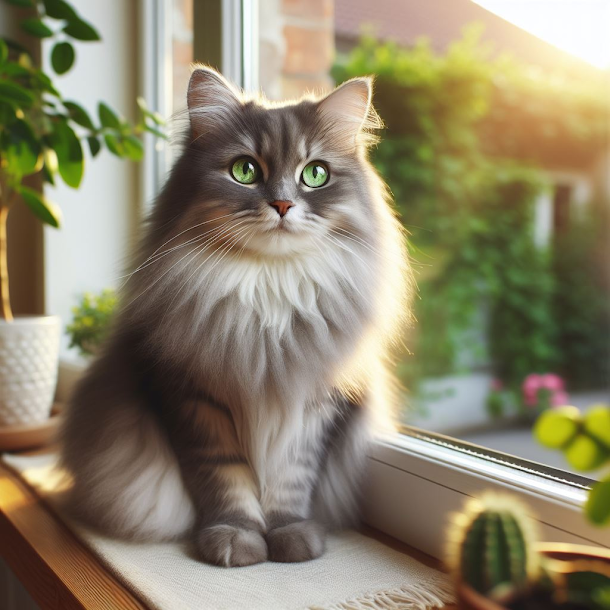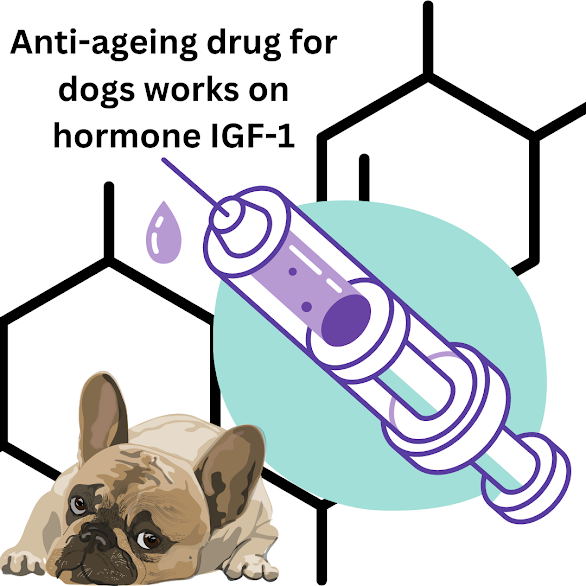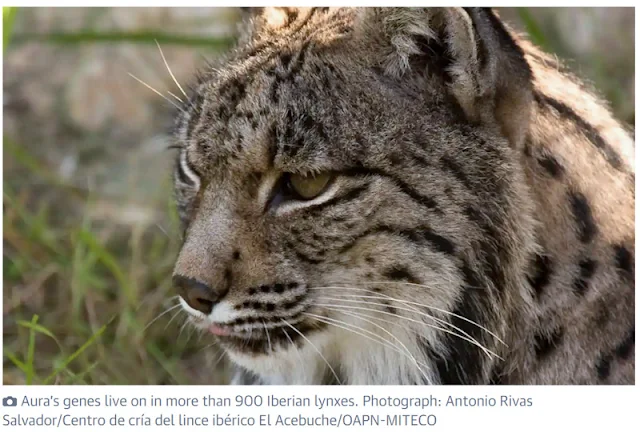Monday, 28 October 2024
Domestic cat benefits from being more social
Thursday, 9 May 2024
For LONGEVITY adopt a perfect weight crossbred, spayed female cat
 |
| Females live longer on average. Click on the image to see the original and to download it if you want to. |
- Sphynx cat breed has the shortest life expectancy of 6.68 years - the cause? HCM (heart disease)
- Burmese and Birman cats have the longest life expectancy of purebred cats (2024) - the reason? Less serious inherited genetic diseases.
Data on lifespan of over 11 million cats and dogs (Banfield Hospitals USA)
| Companion animal | Life expectancy |
| All dogs | 12.69 years |
| Mixed-breed dogs | 12.71 |
| All cats | 11.18 |
| Mixed-breed cats | 11.12 |
| Female dogs | 12.76 |
| Male dogs | 12.63 |
| Female cats | 11.68 |
| Male cats | 10.72 |
| Obese dogs | 11.71 |
| Overweight dogs | 13.14 |
| Ideal weight dogs | 13.18 |
| Overweight cats | 13.67 |
| Obese cats | 12.56 |
| Ideal weight cats | 12.18 |
Saturday, 13 April 2024
New anti-ageing drug for dogs works on hormone IGF-1
 |
| New anti-ageing drug for dogs works on hormone IGF-1. Image: MikeB |
Thursday, 15 February 2024
Routine is important for both kids and cats
Tuesday, 18 July 2023
Average lifespan of domestic cats is about four times longer than the French bulldog's
Let's say the average lifespan of a domestic cat is around 18 years, perhaps a bit less at 16 years. A recent study by a veterinarian which looked at a sample of over 30,000 dogs who died between January 1, 2016 and July 31, 2020 from 18 different breeds and crossbreeds in the UK produced some astonishing results but there may be some distortion because of Covid-19.
 |
| French bulldog. Image by Mylene2401 from Pixabay. |
French bulldog
The most astonishing finding was that the average lifespan of the French Bulldog in the UK is 4.53 years. As I say in the title this is about a quarter (25%) of the lifespan of a domestic cat. I think this distortion might come about because during Covid-19 when a lot of people adopted French bulldogs and they were imported from continental Europe. They were bred at puppy mills; disreputable establishments where the animals were bred very badly and their health was often unacceptable. I don't know the details but there was a lot of talk about the problem.
The actual sample size of the French bulldog was 232 which is quite small but not bad. And Ben the Vet on TikTok comments about this. He says that the average lifespan might be skewered by a large number of the French bulldogs dying at a young age for example after a slipped disc.
Flat-faced, extreme-bred dogs with very short lifespans
Nonetheless, these were real cases in real veterinary clinics and they are a true average of that sample at that time and in that place. And it's appalling. And I don't think the distortion is that bad because the average lifespan of the English bulldog was found to be 7.39 years, for the American bulldog it was 7.79 years for the Pug it was 7.65 years.
These are brachycephalic dog breeds with round heads and flat faces. They are bred to extreme as we say in the business and when you engage in extreme selective breeding you do tend to create health problems which can shorten life spans due in inbreeding and distortions of the anatomy.
Overall average
And also, somewhat worryingly, the overall average age of these 30,000 dogs was a measly 11.2 years. To me, that seems like a very short lifespan. It is certainly considerably shorter than the lifespan of the average domestic cat in the UK. I don't have a study on that but it must be around, as mentioned, 16+ years perhaps as much as 18 years.
Longest-lived
The longest living dog breed is the Jack Russell terrier at 12.7 years. The Yorkshire terrier's average lifespan is 12.5 years. For the border collie it is 12.1 years and for the springer spaniel it is 11.9 years. The average mongrel a.k.a. cross breed is 11.8 years.
Full list
The full list is below.
- Jack Russell terrier - 12.72 years
- Yorkshire terrier - 12.54 years
- Border collie - 12.10 years
- Springer spaniel - 11.92 years
- Crossbred - 11.82 years
- Labrador retriever - 11.77 years
- Staffordshire bull terrier - 11.33 years
- Cocker spaniel - 11.31 years
- Shih-tzu - 11.05 years
- Cavalier King Charles spaniel - 10.45 years
- German shepherd dog - 10.16 years
- Boxer - 10.04 years
- Beagle - 9.85 years
- Husky - 9.53 years
- Chihuahua - 7.91 years
- American bulldog - 7.79 years
- Pug - 7.65 years
- English bulldog - 7.39 years
- French bulldog - 4.53 years
Friday, 11 November 2022
For how long do Iberian lynx live?
 |
| This Iberian lynx lives for 20 years, a record it is believed. |
The book was published in 2002. The stated 14 years of age as a likely and normal maximum lifespan and probably still holds true today. Wikipedia state the average age as 13 years.
Occasionally, and very exceptionally Iberian lynx lifespans can be as long as 20 years as is the case of Aura, who is in the news today as giving birth to more than 900 Iberian lynxes according to the reports. Longevity as you can imagine is greatly enhanced in captivity. The bobcat (part of the same genus as the lynx) also has a long lifespan and is one of the longest lives wild cat species.
Aura was born when there were 94 Iberian lynxes remaining on the planet and it was the most endangered wild cat species. That was when conservation of the Iberian lynx wasn't really seriously on the radar but since then a lot of work has been done to protect this rarest of wild cat species and their numbers have grown.
Each Iberian lynx cost €169,000 to create
Back in the day few Iberian Lynx died of natural causes. About three quarters of all lynx mortality was attributable to human-related activities such as trapping, snaring, poisoning, poaching, shooting and such other countryside activities.
There was even illegal trapping in the above-mentioned national park. Things have changed. Aura was described as a grumpy, strong-willed Iberian lynx. Another reason for the then dire endangerment of this species was a loss of rabbits, the main prey of the Iberian lynx to haemorrhagic disease.
She lived the last part of her life in captivity I guess in order to protect her which may account at least in part for her longevity.
Iberian lynx – comprehensive treatise focusing on conservation 2022
If you like to read more about the Iberian lynx, then please click on the above link which takes you to a full page on the species.
Friday, 16 July 2021
Increasing the life of cats from 15 to 30 years - a cure for feline kidney disease
Professor Miyazaki believes that he might be able to double the expected lifespan of domestic cats to 30 years using a treatment he is working on.
 |
| Toru Miyazaki, 59, professor at the Graduate School of Medicine of the University of Tokyo. Picture: the University. |
His extensive research found a new protein in the blood of humans and animals. He calls it AIM which stands for "apoptosis inhibitor of macrophage". Yes, I know that doesn't help!
He says that feline kidney disease is caused by dead cells piling up in the urinary tract which blocks the passageway like a clogged drain. This leads to kidney damage.
He says that AIM acts as an agent to unclog the pipes. AIM "goes to the problem area through the blood and flags exactly where the waste is. AIM itself does not dissolve the problem cells; rather other cells like macrophages come along to eat them". Macrophages are cells which destroy harmful organisms. They are also described as a "type of white blood cell that eats and digests foreign material inside the body."
He wants to administer AIM to cats via a vaccine as a preventative medicine and perhaps in other ways (orally or in a capsule?). He's started clinical trials in 2020 (reported). He wants the treatment to become a commodity i.e. a useable product by 2022.
 |
| My cat died on CKD. Photo: MikeB |
He's excited by the possibility of AIM extending the lives of cats dramatically. He's correct in saying that feline kidney disease is a mass killer, shortening the lives of domestic cats in huge numbers.
His work is reactive essentially. I hope that he is successful but what about researching the reason why feline kidney disease is so disastrously prevalent in the domestic cat population? Is it the food? It might be. Why do domestic cats die of kidney far more often than humans? We need to address that question with more vigour.
No one comes up with a satisfactory answer as to why domestic cats are so predisposed to kidney disease. The situation indicates an underlying but as yet unknown environmental reason. My best bet is the commercial foods that we feed them. It might be the dry foods which have gained in popularity tremendously over the past decades.
CKD affects 8+ percent of cats of 10 years old and older. One well-known vet, Dr Elizabeth Hodgkins believes that dry cat foods are the culprit and feeding high quality wet foods can help dramatically plus a powdered phosphorus binder. One cat, Georgia, did very well on "fluids, a phosphate binder and a commercial high-protein diet. Read her book Your Cat to find out more.
Cat owners should also wish the best of luck to the professor in his quest to increase the life of domestic cats from 15 to 30 years.
Saturday, 12 June 2021
Lil Bub and Grumpy Cat both died of bacterial infections at a young age
Both Lil Bub and Grumpy Cat both died of bacterial infections at the age of 8 and 7 respectively. Both were dwarf cats. Lil Bub's infection was in her bones while Grumpy Cat's infection was in her bladder i.e. it was a urinary tract infection.
 |
| Lil Bub and Mike Bridavsky, her human guardian during most of her shortened life. Photo in public domain. |
There were both chronic infections that could not be cured in the usual way with antibiotics. I don't want to say anything untoward or nasty because both these cats entertained millions of people. They made a lot of people happy and they made them smile. They therefore performed a service to humanity but they died very young with lifespans at least half of normal.
It is very unusual for a cat to die a bacterial infection at the age of 8, as happened for Lil Bub. It is impossible not to be drawn to the conclusion that the inherited genetic mutations which made them both money spinning celebrities through their unusual appearance, also killed them.
I would speculate quite confidently that if they had not suffered from dwarfism in the case of Grumpy Cat and Dwarfism in conjunction with osteopetrosis in the case of Lil Bub, they would not have died for these reasons.
Osteopetrosis is a bone disease which causes dense bone which fills the centre of the bone where there should be bone marrow. There are other effects too cats with this inherited condition which cause cats to be prone to chronic bacterial bone infections.
 |
| Grumpy Cat and Rafi Fine at the 2014 VidCon at the Anaheim Convention Center in Anaheim, California. Photo: Gage Skidmore on Wikipedia. |
Dwarfism in felines can have associated conditions which I discuss on another page. If people are interested in why these celebrity cats died at such a young age we have to speculate because their owners have been reticent in disclosing in any detail regarding the cause of death.
In respect of Lil Bub, it seems clear to me that the inherited medical conditions due to genetic mutations ultimately caused her premature death. In respect of Grumpy Cat, the same conclusion, I feel, needs to be drawn. It is likely that she became resistant to antibiotic treatment for a chronic bladder infection and so the infection killed her.
If I'm anywhere near right on this then it does call into question whether people should put on a pedestal and monetise domestic cats who are sadly born with inherited genetic conditions which make them look cute but also which makes them vulnerable disease and a shortened lifespan.
I discuss in a bit more detail the cause of death for both these cats which you can access by clicking here for Lil Bub and here for Grumpy Cat.
Wednesday, 23 July 2014
Feral vs Indoor Cat Lifespan
The truth is no one has been analysing cat lifespans. These are estimates or to be more generous "guesstimates" based on a reasonably assessment.
Another point to make is that a full-time indoor cat might not, on average, live longer than an indoor/outdoor cat.
ASPCA says that the average lifespan of an indoor cat is 13-17 years with some living to 20 plus but that is not an average is it? That is a very generous spread based on informed guesswork.
 |
| My late lady cat aged about 16 years of age at the time. I had just wiped her coat which is why it looks a bit wet. She lived four more years. |
Petco says that an indoor cat has an average lifespan of 12-20 years (even more of a spread and not an average in my view). They also say that outdoor cats (cats kept outdoors full-time I presume) live for 1-5 years. This is highly simplified. No one keeps a domestic cat full-time outdoors - well, very few people do. I suppose they are referring to feral cats but don't say that. This is neither scientific nor accurate information.
Wikipedia confidently state 12-15 years as an average "life expectancy of a cat". They must mean the domestic cat as opposed to the feral cat.
Wikipedia quote a study as assessing the feral cat lifespan at 4.7 years. The links to the study are broken so I could not read it.
Indoor cats need more play to make them active. People in general don't play enough with their cats. An indoor cat arguably is more likely to become obese and obesity is the cause of many serious illnesses which can be life threatening. Outdoor cats within a secure enclosure will get exercise safely. This is rare however. People aren't bothered to build decent enclosures to be honest.
We know that outdoor cats, meaning stray cats and feral cats, live shorter lives than well cared for domestic cats who live mostly inside the family home. We can probably rely on 14 years as being a reasonable guess at the domestic cat lifespan. I'd favour a bit longer say 15 years. Like people cats are living longer but also like people dementia is more commonplace. Are cats living too long sometimes?
Feral cats will be lucky to live beyond five years on average but many may live to a not dissimilar age as domestic cats if cared for by a feral colony carer i.e. a person who feeds and TNRs the cats as part of a program. Many feral cat carers provide winter housing as well as feeding. There are many factors so averages don't really help. It is about individual cats.
Featured Post
i hate cats
i hate cats, no i hate f**k**g cats is what some people say when they dislike cats. But they nearly always don't explain why. It appe...

Popular posts
-
The big Maine Coon cat (MC) is very impressive and the biggest purely domestic cat in the world (I am excluding the wildcat hybrids ) but no...
-
Photo of Nebelung Cat Lovenblues Mozart Bronikowski copyright © Helmi Flick – please respect copyright. The Nebelung has a medi...
-
Russian Blue Kitten photograph by Sensual Shadows Photography Before you go in search of Russian Blue Kittens have a look at these and h...




